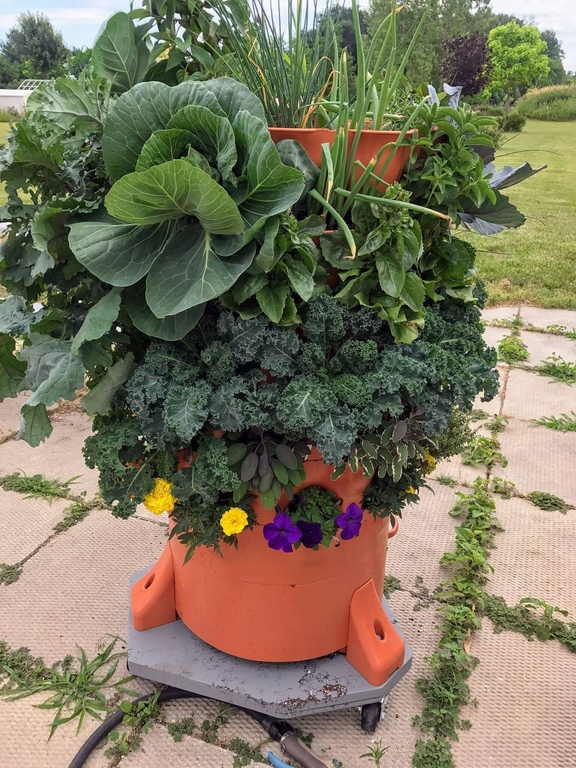
Vertical Garden Management
Purchase a vertical garden system through my commission links and get 12 months of ongoing support to help you grow and maintain your garden. Available to Oahu residents only at this time.
You will be responsible for purchasing the tower, seeds, soil, worms, and other amendments as needed based on the system you've chosen.
You will be responsible for purchasing the tower, seeds, soil, worms, and other amendments as needed based on the system you've chosen.
Vertical gardening, also known as vertical farming or vertical horticulture, is a method of growing plants vertically, often on walls or other vertical surfaces. Here are five benefits of vertical gardening:
- Maximizes Space: Vertical gardening allows you to utilize limited space effectively. By growing plants vertically, you can take advantage of vertical surfaces such as walls, fences, or trellises, which helps you grow more plants in a smaller footprint. This is especially beneficial for urban environments or small gardens where space is limited.
- Increased Yield: Vertical gardening can significantly increase your crop yield per square foot of gardening space. By utilizing vertical space, you can grow multiple layers of plants, stacking them one above the other. This means you can grow more plants in the same area, leading to higher overall yields.
- Improved Air Circulation and Sunlight Exposure: Vertical gardening often allows for better air circulation around the plants, reducing the risk of diseases caused by stagnant air. Additionally, vertical structures can be strategically positioned to maximize sunlight exposure for the plants, ensuring they receive adequate light for photosynthesis.
- Easy Maintenance and Harvesting: Vertical gardens are generally easier to maintain and harvest compared to traditional horizontal gardens. The vertical arrangement makes it easier to access plants for pruning, watering, fertilizing, and harvesting. This reduces the strain on your back and knees and simplifies routine gardening tasks.
- Aesthetically Pleasing and Versatile: Vertical gardens can be visually appealing and add a unique touch to any space. They can transform plain walls into lush green landscapes, creating a beautiful and inviting atmosphere. Vertical gardening also offers versatility in terms of design and creativity, allowing you to experiment with various plant combinations and arrangements to create stunning displays.
Aeroponic Vertical Farming
Aeroponic vertical farming is a specialized form of vertical farming where plants are grown in an environment where their roots are suspended in air and regularly misted with nutrient-rich water. Here are five benefits of aeroponic vertical farming:
- Water Efficiency: Aeroponic systems use significantly less water compared to traditional soil-based farming methods. By misting the roots with a fine nutrient solution, water is efficiently delivered directly to the plants, minimizing water waste. The closed-loop system of aeroponics allows for the recycling and reusing of water, further reducing water consumption.
- Increased Crop Yield: Aeroponic systems promote rapid and healthy plant growth, which can result in higher crop yields compared to conventional farming methods. The fine mist of nutrient solution delivered directly to the roots provides plants with an optimal balance of water, oxygen, and nutrients, creating an ideal growth environment. This encourages faster growth, earlier maturity, and increased productivity.
- Space Optimization: Vertical aeroponic systems maximize the use of available space by stacking multiple growing layers vertically. This allows for a higher plant density and increased crop production per square foot. Vertical farming also enables year-round cultivation, making it particularly advantageous in urban areas with limited space.
- Reduced Pest and Disease Risks: In an aeroponic system, plants are not in contact with soil, which helps reduce the risk of soil-borne pests, diseases, and weeds. Additionally, the controlled environment of aeroponics, including temperature, humidity, and lighting, minimizes the likelihood of pest infestations. These factors contribute to healthier plants and a reduced need for chemical pesticides, making aeroponic vertical farming an environmentally friendly option.
- Faster Growth and Crop Rotation: The optimized nutrient delivery and controlled environment in aeroponic systems promote accelerated plant growth. Plants grown aeroponically tend to mature faster than those in traditional soil-based systems. This allows for more frequent crop rotations, enabling farmers to produce multiple harvests in a shorter period. The ability to quickly cycle through crops increases overall productivity and offers flexibility in adapting to market demands.
Vermicomposting Vertical Farming
Using a vermicomposting vertical planter, which combines vertical gardening with the process of vermicomposting (composting with worms), offers several benefits. Here are five advantages of utilizing a vermicomposting vertical planter:
- Nutrient-Rich Soil: Vermicomposting is an excellent method for producing nutrient-rich soil or compost. As worms consume organic matter, such as food scraps and plant waste, they break it down and release nutrient-rich castings (worm manure). These castings are highly beneficial for plant growth as they contain essential nutrients, enzymes, beneficial bacteria, and microorganisms that enrich the soil.
- Sustainable Waste Management: Vermicomposting vertical planters allow you to recycle and repurpose kitchen scraps and other organic waste. Instead of throwing them in the trash, you can feed them to the worms in the vermicomposting bin. This reduces organic waste sent to landfills and helps to minimize environmental pollution while transforming waste into valuable resources.
- Improved Plant Health and Growth: The nutrient-rich vermicompost produced in a vermicomposting vertical planter provides plants with a steady supply of essential nutrients in a readily available form. This promotes robust root development, enhances soil structure, and improves moisture retention. The vermicompost also contains beneficial microorganisms that contribute to healthier soil and increased plant resistance to pests and diseases.
- Space Optimization: Vertical planters, combined with vermicomposting, make efficient use of limited gardening space. By growing plants vertically, you can maximize your growing area while simultaneously utilizing the vertical planter as a composting system. This is particularly advantageous for those with small gardens or balcony spaces.
- Low-Maintenance and Self-Sustaining: Vermicomposting vertical planters are generally low-maintenance and self-sustaining once established. The worms naturally consume organic waste and convert it into compost, reducing the need for external fertilizers. Additionally, the composting process generates heat, which helps to regulate the temperature in the vertical planter and supports plant growth throughout the year.
This package includes
- in person and phone or virtual support over 12 months to help you get started and maintain your system

Investment
$600
OR
12 payments of $50 (monthly)
Questions?